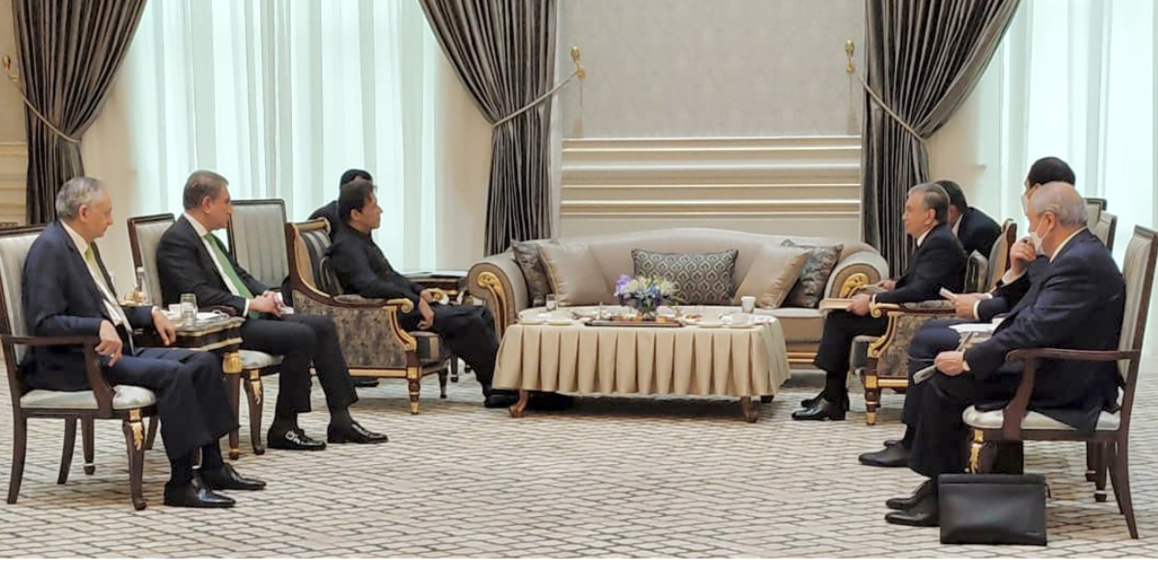Prime Minister Imran Khan has renewed Pakistan’s commitment to deepen Pakistan’s engagement with Central Asia, with focus on strengthening trade, investment, energy, connectivity, defence and security, and people-to-people contacts.
The PM made the remarks during his visit to Uzbekistan on Thursday.
The Prime Minister recalled his earlier interactions with President Shavkat Mirziyoyev and noted the recent increase in high-level exchanges creating a strong momentum in the growth of bilateral relations
The Prime Minister highlighted growing trade and transport links between the two countries and lauded the finalization of the Transit Trade Agreement (AUPTT). It was noted that bilateral trade had recently grown four-fold and had the potential to grow several fold through concerted efforts. The Prime Minister also highlighted that a large delegation of top Pakistani businessmen was visiting Uzbekistan and had held successful interaction with their counterparts.
The PM expressed Pakistan’s full commitment and support to Trans-Afghan railway project, which he stressed was of key importance in advancing the connectivity agenda. The Prime Minister also underlined provision of sea access to Uzbekistan through Pakistani seaports.
On the invitation of President of Uzbekistan Mr. Shavkat Mirziyoyev, Prime Minister Imran Khan reached Tashkent for a two-day official visit today.
The Prime Minister was received by the Prime Minister of Uzbekistan and high-level officials of the Uzbek government. The Prime Minister is accompanied by a high-level ministerial delegation including Foreign Minister Makhdoom Shah Mahmood Qureshi, Interior Minister Sheikh Rashid Ahmed, Minister for Information and Broadcasting Fawad Chaudhary, Minister for Maritime Affairs Ali Zaidi, Advisor to the Prime Minister on Commerce and Investment Abdul Razak Dawood, National Security Advisor Moeed Yousaf, and Foreign Secretary Sohail Mahmood.
After Official reception ceremony, the Prime Minister held a one-on-one meeting with the Uzbek President during which both leaders discussed a wide range of subjects — including the historic and cultural ties between the two countries, the shared commitment to comprehensively upgrade Pakistan-Uzbekistan relations in all dimensions, the resolve to enhance bilateral trade and investment ties, the imperative to promote regional connectivity, and the desire to deepen cultural cooperation.
In the regional context, the vital importance of peace and stability in Afghanistan was emphasized. It was agreed to enhance bilateral consultations as well as coordination at the regional level. Later, the two leaders led their respective sides in delegation-level talks and reviewed the entire gamut of bilateral relations.
They also exchanged views on key regional and international issues, including recent developments in Afghanistan. Both sides expressed satisfaction on the status of existing ties and cooperation at regional and international fora.
Speaking on situation in Afghanistan Prime Minister reiterated Pakistan’s support to a peaceful and stable Afghanistan as it was important for security, economic benefits and development of Pakistan, neighboring countries and beyond. The Prime Minister highlighted Pakistan’s steadfast support for Afghan peace process and efforts to promote a negotiated political settlement. In the cultural realm, the common cultural heritage was highlighted and promotion of Ziyarat tourism between Pakistan and Uzbekistan was endorsed. It was also agreed to produce a joint film on the life of Mughal Emperor Zaheer-udin-Babar.
The delegation level talks were followed by signing a Joint Declaration on establishment of Strategic Partnership and MoUs/ Agreements in wide range of areas. The landmark Transit Trade Agreement was also signed by Mr. Abdul Razak Dawood from the Pakistan side and Deputy Prime Minister for Trade and Investment of Uzbekistan.
After the prestigious ceremony, the two leaders jointly addressed the joint media stakeout.
On 16 July, the Prime Minister will participate in the opening ceremony of the International Conference “South Asia-Central Asia Regional Connectivity-Challenges and Opportunities”. The Conference will see a gathering of leaders from South and Central Asia aimed at discussing ways and means to increase connectivity between the two regions.



Comments are closed.